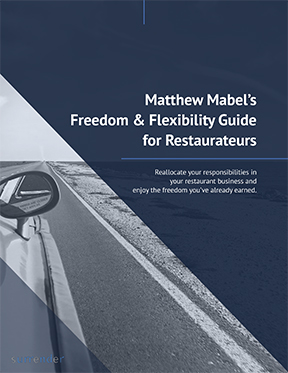
“Believe me: I’m extremely aware that I compete with everyone in my segment—and most of the people in the other segments, too!”
I often hear those words from people like you: successful owners of multi-unit independent restaurant companies.
They live their lives as if everyone competes with them.
So a burger concept owner thinks his company competes with every burger place; a pizza purveyor believes his company compete with every pizza option; and a high-end chef-driven group knows it competes with every other high-end dining room.
This choice of lifestyle is not helpful to them.
This thinking? Wrong.
Focus Only on Your True Competition
Restaurants compete with a small group of concepts in their segment closest in offerings, locations, history, branding, messaging, and culture.
My process isolates true competition within a segment—eliminating most of the restaurants people think they compete with.
The result is like getting your first set of prescription glasses (the ones you thought you didn’t need) and suddenly seeing what you have been missing.
It brings extreme clarity to my clients’ decision making.
If you want to grow revenue, focus on uniqueness relative to those few concepts close to yours.
And forget everyone else.
Put them out of your mind like an obviously wrong answer on a multiple-choice test.
They don’t matter.
Focus on where 80% of your guests come from, not the other 20%.
Unique Restaurants Are Prepared to Win the Battle
Uniqueness makes a diner choose to drive to your restaurant, park their car, and walk in—instead of the doing the same at the restaurant right across the street.
Uniqueness makes people exuberantly post on social media and influence their friends to enjoy what they identify as superior for them and their friends.
Uniqueness gives your guests trust, confidence, and loyalty to your brand, and allows you to stretch your offerings and innovate without taking guests too far out of their sacred comfort zone.
Matthew’s Three Signs You Own an Ordinary Restaurant
- No definition. You, your guests, managers, and team can’t explain clearly what makes your restaurant unique.
- No innovation. You, your managers, and team can’t point to new and different things you are doing this year, and others planned for next year, that will set you apart.
- No attention to competition. Your organization does not have an encyclopedic knowledge of your head on competition—knowledge you constantly update.
When you suffer from these ailments, you have no way to understand what your guest already knows.
When you handle definition, innovation, and knowledge of your competition, you can craft menu items, marketing, and service that motivates your guest.
This will increase your guest count, PPA, and revenues under any market conditions.
Over to you. What makes your concept unique? And what current work is designed to increase characteristics that give you an unfair competitive advantage?

